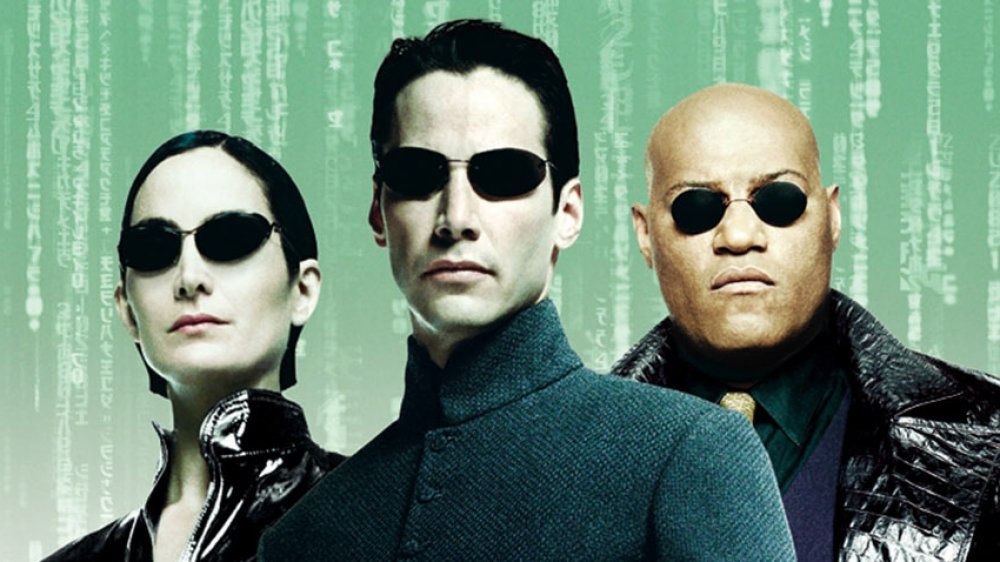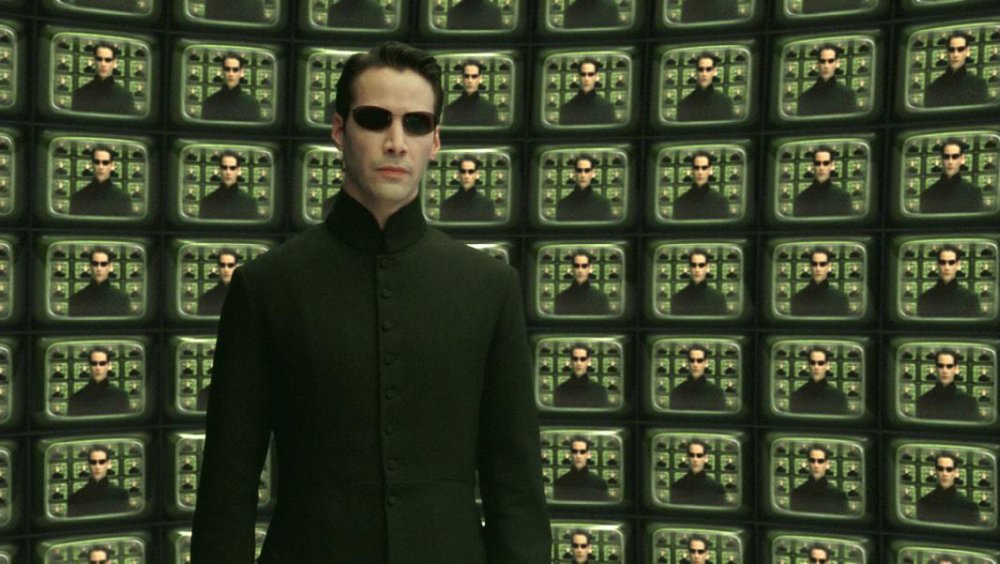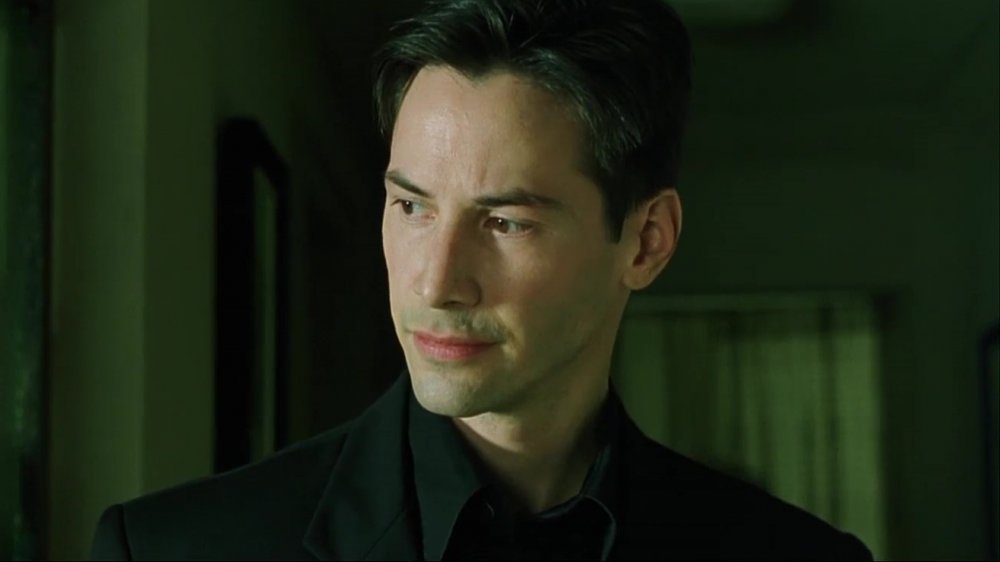The Matrix 4 Will Reportedly Start Something Big
The red pill has been extended to us once again, and it could spark the beginning of something major.
Since the summer 2019 announcement that Warner Bros. had greenlit a new Matrix movie, the speculation train's been a-rollin' over whether a return to Neo's dystopia might go beyond a fourth installment. That chatter may be slowly drifting towards reality — at least according to We Got This Covered.
Citing its always-anonymous (and completely unverified) sources, the outlet claims that The Matrix 4 will blossom into a trilogy.
However, WGTC does express doubt as to whether Keanu Reeves (who portrays Neo, the "One" meant to save humanity from the Matrix and win the war against the machines) and Carrie-Anne Moss (who plays the computer hacker and vigilante Trinity) will be in the two movies that will allegedly follow The Matrix 4.
As ever, we need to remind the eager that this is absolutely still a rumor, and even if The Matrix franchise creator Lana Wachowski herself announced tomorrow that she does indeed intend to revive the film series with The Matrix 4, the nature of movie-making doesn't guarantee three new movies will come to fruition.
If a trilogy does eventually materialize, what value exists in revisiting the universe seemingly closed by all the deaths at the end of The Matrix Revolutions? This is the era of earned and unearned reboot fever, and it's natural that there might be a cynical knee-jerk reaction questioning the validity of a new Matrix film, much less another trilogy.
Let's take a look at how likely — and unlikely — it is that The Matrix 4 truly will spawn a new trilogy.
The potential value of a new Matrix trilogy
The Wachowski sisters, Lana and Lilly, created what was arguably the most formative action film style of the new century with the original Matrix trilogy, which spanned the 1999 film and its two 2003 sequels The Matrix Reloaded and The Matrix Revolutions. That alone is an incredible legacy, but its second achievement is its social impact. Many have noted over the past 20 years that the Matrix trilogy is, conceptually, an allegory about trans existence and the process of realizing non-cisgender identity. There's a whole body of critique and analysis around it since Lana first came out as a trans woman in 2010 (and Lilly later came out in 2016). The metaphor of gender fluidity and actualizing independent identity presented in the entire Matrix trilogy was intentional, but it's impossible to say if, at the time, the sisters understood and accepted their own gender identities. It's easy to imagine one or both sisters sitting down to watch the final cut in 1999 and arrive at a critical epiphany, just as many other people have in the two decades since the first Matrix film debuted.
This is why there's great value in returning to the Matrix's universe now, in a more open and accepting social landscape. There's much that can be said on a person level by Lana Wachowski, who's returning to the director's seat for The Matrix 4, as well as on a more general sociopolitical one. The fourth flick will not only give Lana a chance to build upon the art that made her famous in a way that's even more reflective of herself, and potentially continuing such commentary by discussing aspects of society related to wealth and capitalism, race, politics, and more. Lilly has said she isn't participating in making The Matrix 4 because she has no interest to, so this is Lana's specific interest. There's no doubt she has things she wants to say specifically through the universe she helped create — and that likely can't be done in just one movie.
The suddenly fraught business of franchises could prevent a second Matrix trilogy
Though there are good reasons from a narrative standpoint to expand the Matrix universe further, that doesn't necessarily mean it makes a whole lot of business sense. True, every studio these days is chomping at the bit for any franchise opportunity, but not all has gone smoothly, and franchise fatigue is still a very real thing. (It even existed during the original run of Matrix films — you can see it in reviews of The Matrix Revolutions.) Getting almost two decades away from the last entry can cool anybody's overheated franchise jets, but that doesn't mean a revisit — or more specifically, a reinvention — will net positive results.
A solid recent example of this is Star Wars.
Bringing back the film series' core Skywalker narrative with The Force Awakens, The Last Jedi, and The Rise of Skywalker has yielded mixed critical response and turned what was a historically harmless, taciturn fandom into a vicious battlefield. While it's not going to staunch the flood of franchise content, the hit-and-miss critical performance of the newest Star Wars trilogy (that came over a decade after the prequels) could serve as a cautionary tale about creating new trilogies and how to approach marketing them. Sure, a studio could possibly make a billion dollars (which is really not a guarantee for any franchise that doesn't have the deep pre-baked interest of a Disney possession), but that may also come with the cost of critical underperformance of not just the franchise but also the studio. Money can be taken and run off with; a film's (or multiple films') spectre, if sufficiently lambasted in the press, will creep into discussion of entirely different films released by the studio. That's a pricey long-term gamble in this highly competitive feature film market.
Right now, the facts are thus: Reeves and Moss aren't signed to anything past this single new Matrix movie. We Got This Covered's article admits this fact outright. Jonathan Groff and Neil Patrick Harris have been cast in secretive roles, and Yahya Abdul Mateen II has been cast in an equally mysterious role that at present is rumored to be a younger version of Laurence Fishburne's Morpheus. If that rumor is true, a potential time-travel plot muddies the speculative waters tremendously, but that is still a big if. A new wave of characters does imply more could be forthcoming, but in truth, what kind of story doesn't involve at least Neo in his capacity as The One?
More importantly, if that story could even conceivably exist, will any audience care? Reeves made headlines recently by saying the script for Matrix 4 is "ambitious." He's excited for his return and the screenplay that will drive the story, but "ambitious" can mean anything. In today's world, an ambitious storytelling flex would be... well, to end a story. Permanently. Even Revolutions didn't technically do that — the Matrix is still operating under a negotiated peace, and the possibility is left open that Neo could one day return despite his seeming on-screen death. That's not an end at all, so perhaps this final, fourth entry is meant to close that book on its own terms.


